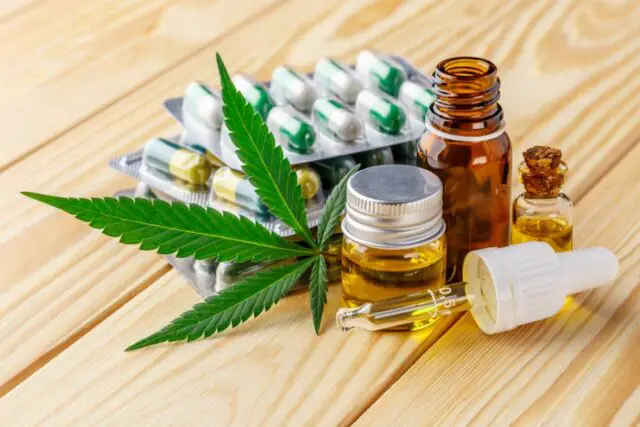The latest trend among supplements for their positive impact on health is cannabidiol, also known as CBD. But where did CBD come from? What is its popularity based on? Below, we will answer these questions and discuss the potential benefits of this supplement.
What is CBD?
CBD is one of the main active components of the Cannabis sativa plant, hemp or marijuana. But unlike THC (tetrahydrocannabinol), the most famous ingredient in cannabis for its psychotropic properties, CBD is not psychoactive. The World Health Organization itself has indicated that the use of CBD in humans is safe and that it does not show any potential risk of abuse or dependence.

Therefore, in CBD it is a completely legal substance and has emerged as an attractive option to relieve pain and other symptoms without the effects that are associated with marijuana or cannabis (THC).
The most common use of CBD is in oil. It is made by extracting CBD from the cannabis plant and then diluting it with a carrier oil such as coconut oil or hemp seed oil.
Evidence on the use of CBD
Due to its current boom and popularity, research on CBD is on the rise and there are beginning to be studies associating this substance with certain healthy properties. For example, it is being studied as a treatment for a wide range of conditions, including Parkinson’s disease, schizophrenia, diabetes, multiple sclerosis, and anxiety.
On the other hand, there is already a drug with CBD approved to treat epilepsy. Although the research supporting the benefits of CBD is still limited, there are many ongoing clinical studies on the effects of cannabidiol.
CBD Benefits
Animal studies and human research suggest that CBD can be applied to:
Treat some epilepsy síndromes
The strongest scientific evidence is its efficacy in treating some of the childhood epilepsy syndromes, such as Dravet syndrome and Lennox-Gastaut syndrome (LGS).
Calm anxiety and depression
It is possibly the most popular effect of CBD and the reason it has become so popular.
Reduce Post Traumatic Stress Syndrome
Some researchers have experienced reduced symptoms of this syndrome by including CBD along with psychiatric care.
As a curiosity, the Department of Veterans Affairs of the US Army is financing a study on the impact of CBD on the post-traumatic stress disorder that many soldiers suffer when returning home from a war scene.
Treat opioid addiction
CBD could be used to help treat people who are dependent on opioids, reducing their cravings for withdrawal. Research is also being done on its ability to reduce cravings for tobacco and other drugs.
Ease pain
It appears to significantly reduce severe, sharp pains and itchy, cold sensations. In this respect, topical use is more direct and its effect more pronounced. The use of CBD for the treatment of pain from diseases such as sclerosis and osteoarthritis is being investigated. CBD could produce an analgesic effect by inhibiting inflammatory and neuropathic pain.
Reduce insomnia
Some studies suggest that CBD can help both fall asleep and stay asleep, improving sleep quality.
Relieve diabetic complications
Cell tests reduce the effects of high glucose levels that usually precede the development of diabetes and other diseases. Therefore, CBD could be beneficial in patients with diabetes, helping to regulate insulin levels and reducing insulin resistance.
Protects against neurological diseases
CBD appears to have antioxidant and anti-inflammatory properties. The researchers deduce that these characteristics may provide protection against numerous disorders such as Parkinson’s, Alzheimer’s or multiple sclerosis.
Other Considerations About CBD
Depending on the country, CBD is marketed as a food supplement or as a product for topical use. It is not a medicine. It is advisable to purchase it from a trusted company that ensures the quality of the ingredients. Products were found whose labels did not correspond to the actual quantities.
In case you take medications, talk to your doctor to confirm that they do not interfere with CBD. As for the dose, there is no set amount. It is recommended to start with small doses and adjust according to the effects.
Forms of CBD presentation
CBD can be found in many forms and modes of use to suit the personal preferences of each one. The bioavailability of CBD is different between them. Both the amounts in each product and its absorption can vary greatly:
- Oils and tinctures (extracts of plant material dissolved in ethanol).
- Flavored chewy gummies.
- Aerosols with a nozzle to spray into the mouth.
- Soft capsules that are taken orally.
- Inhalable vapors through heating CBD oil.
- Foods to which CBD oil has been added.
- CBD-containing beverages.
Keep in mind that the legislation of each country can regulate each of them.
In summary
CBD is a food supplement that has grown in popularity due to its potential benefits for health and the treatment of some diseases. Unlike the THC found in marijuana, CBD is not a psychoactive substance. It is legal and safe. If you want to try the properties of CBD, always look for a trusted source. And remember to let your doctor know if you take medication. Your health will thank you!

For those who have experienced shifts in consciousness and know that more peace, joy, and love awaits in a better living environment. A bold shared vision. A living community and hub for innovation. A sustainable ecosystem for living and working. A model for the new future.
